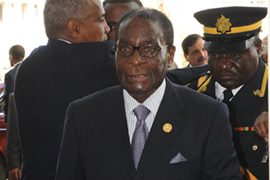Zimbabwe ‘aid dependence growing’
Humanitarian groups say over half the country’s population may need food assistance.

The worsening humanitarian crisis comes against a backdrop of political deadlock.
Mugabe and Morgan Tsvangirai, the opposition leader, are just beginning to agree on a power-sharing deal after disputed elections in March last year.
The sticking point has been the distribution of key ministerial positions within the government between Mugabe’s Zanu-PF and Tsvangirai’s Movement for Democratic Change.
Hungriest months
With no money to buy food and in some cases no food to buy, people are scrambling for the only sustenance they can find.
| Video | ||
|
|
Al Jazeera’s Haru Mutasa said conditions in one place, Bingam, have become so desperate that families are resorting to trade the only animals they have just to feed themselves.
“One cow will get a family 10 bags of maize,” she said.
The country’s consumer watchdog has warned that many families are becoming increasingly vulnerable to poverty and hunger, as some basic commodities are no longer available on the market because of hoarding.
Lee said the WFP and other non-governmental organisations (NGOs) were getting food into Zimbabwe but that February and March would witness an increase in food shortages as the new harvest is not expected until April.
“Together with some American NGOs, the WFP is aiming to reach around seven million people in February and again in March,” he said.
“So we are getting food to people who need it but these are the two hungriest months – February and March.
“And it is still going to be a struggle for many people to get through until April when the new harvest will start coming.”
Lee said donors had been “remarkably generous”, providing over $240 million worth of assistance for operations in Zimbabwe in 2008 and 2009.
“So it is not really a question of donors not coming forward to support, ” he said.
Economic complications
Hyperinflation and a tottering economy have compounded the humanitarian disaster.
The Zimbabwean dollar has been rendered practically worthless, leading to severe shortages of food and foreign exchange.
 |
| Mugabe and his opponents are trying to agree on a power-sharing arrangement [AFP] |
Zimbabwe’s central bank devalued its dollar on Monday by 12 zeros, turning one trillion dollars into one dollar, and issuing seven new notes.
To complicate the situation, a cholera crisis has reached unprecedented levels, with nearly 63,000 people being infected by the epidemic, according to a report by a UN agency.
The epidemic, which began in August, has already killed more than 3,000 people – the deadliest outbreak in Africa in 15 years, the World Health Organisation (WHO) said.
The report said a lack of awareness about the disease, inaccessibility to clean water and medicine shortages have made stopping the spread of cholera impossible.
UN figures show only 23 per cent of the population has access to safe drinking water – a percentage likely to be worsening because of drought.
The UN’s Food and Agriculture Organisation said more than one million people were at high risk of infection in absence of safe drinking water, after more than 70 per cent of springs, irrigation canals and rivers around the country had dried up.
